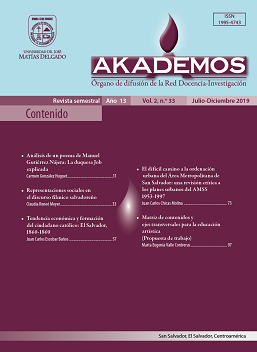Economic trend and training of the Catholic citizen: El Salvador, 1860-1869
DOI:
https://doi.org/10.5377/akademos.v0i0.9510Keywords:
economic expansion, labor control, citizenship, legislative instability and educationAbstract
Agriculture, economic expansion and enrichment of the elite is a trilogy that determined the behavior of politics and education development between 1860 and 1869. The conformation of the Salvadoran State, in special, the gradual replacement of the indigo by the coffee, declared by Gerardo Barrios and disseminated by Dueñas, the formation of citizens able to understand this dynamic development and workforce control are, among other things, characteristics of a time marked by the economic decline, the legislative instability and protection of the private property seen as export; which is equivalent to saying that Salvadoran society, by its very peculiarity, institutionalized forced labor (especially those indigenous and mulatto) and consolidated the privilege of caudillos (liberals and conservatives) by control of the means of production and the direction of political structures.
Downloads
1472

